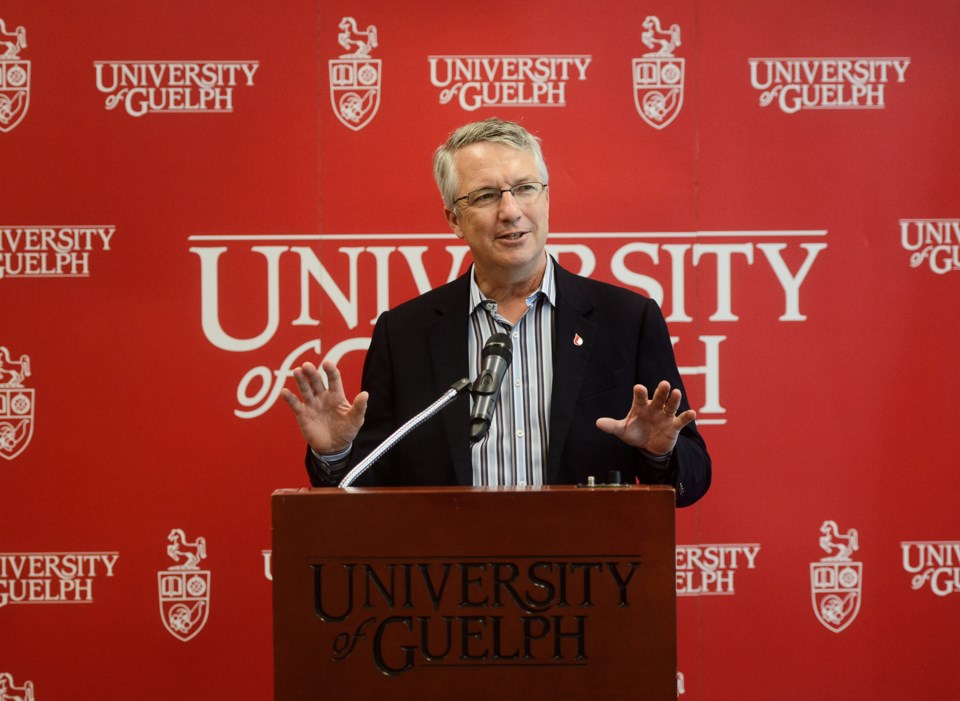Guelph’s member of parliament says there is no need to panic, but now is the time to take care of one another in the face of the COVID-19 pandemic.
Lloyd Longfield, MP for Guelph, is back at home after what he called some ‘challenging weeks’ dealing with COVID-19 in Ottawa.
“It’s not to panic, but it is real,” said Longfield of the pandemic. “When a snow storm hits — that’s real too and we have to look out for each other and help neighbours. Instead of shovelling the driveway, maybe we help with the groceries or make sure when you’re sick that you’re not visiting your neighbours.”
One of his priorities on Saturday will be grocery shopping for one of his neighbours who has a broken foot.
“Talking to the ladies in the office, they say I have to give it more than an hour because the stores are pretty crowded right now.” he said. “Let’s not be loading up our carts with two years worth of toilet paper, we have to be responsible because everybody needs access to stuff.”
Longfield also stopped by the Canadian Blood Services clinic on Saturday to give his 114th donation.
While in Ottawa, Longfield said he kept in close contact with Dr. Nicola Mercer, medical officer of health for Wellington-Dufferin-Guelph Public Health.
“I have been calling her throughout this just to see how it’s going at Public Health and getting a sense of where she’s at, with the setting up of the test unit,” said Longfield.
During the 2003 SARS epidemic, Guelph General Hospital estimated the cost of the SARS crisis to be about $485,000 in salaries, masks, gowns, gloves and antiseptic hand-wash.
Forty-four people in Ontario died from SARS in March 2003. Although dozens of patients were quarantined in Guelph at the time, no local confirmed cases were ever discovered.
Longfield said the government learned a lot from SARS and has prepared funding for health care providers, as well as for research.
“We set up the Canada Health Agency as a result of (SARS), so that we would be better prepared to do what we are doing right now when things hit again,” said Longfield. “There’s $50 million for supplies for clinics, if they are getting beyond their budgets they can apply for things like emergency rooms and different health care providers.”
“The dollars are available to Guelph. It’s something people apply into, depending on what they are doing,” said Longfield. “If research needs funds, there’s a stream they can apply into.”
The government’s priority, said Longfield, is trying to prolong the peak of infection for COVID-19, so the health care system does not become overloaded.
It could be six months, it could be 18 months, who knows how long it could last?” said Longfield. “If the wave really hits they are going to have to start to make decisions about who gets care and who doesn’t get care and we don’t want to get to that point. It’s a case of everybody has a role to play.”
Longfield said the constituency meetings he had planned for next week will go ahead, with some extra precautions in place, including hand sanitizer and masks for those who are coughing.
“We need to continue to live our daily lives, but we just need to take the right precautions,” he said. “People coming into my office, if they were sick and sniffling, we would make sure they have a mask on. I have to touch the drops that they are sneezing on to the table and then touch my face to transmit the disease, I don’t get it from breathing the air that they are breathing.”
“We are taking it pretty seriously because we do a lot of things in the community and we don’t want to be the ones spreading germs,” he added.
Longfield said elbow bumps replaced handshakes last week on Parliament Hill.
“At the start of the week we were joking about it — by the end of the week we weren’t joking about it,” he said.
Longfield said the government knows the economy is going to take a hit.
Finance Minister Bill Morneau addressed the concerns by announcing a stimulus program worth $10 billion to help business weather what he called the ‘health crisis.’ The Bank of Canada said it was cutting its key rate by 50 basis points to 0.75 per cent.
One thing Longfield said still needs to be worked on is how best to support working Canadians.
“(The stimulus) is not going to help contractors, people working out of their house, self-employed people, so we are working on a solution for them and there will be more to say on that once the budget is tabled, which is scheduled for March 30,” said Longfield.
Before the end of the interview, Longfield received an alert that parliament has been closed until at least the end of April, which he said complicates the budget process.
The senate, which is required to pass the budget into law, will also not be sitting in the foreseeable future.
With files from The Canadian Press
